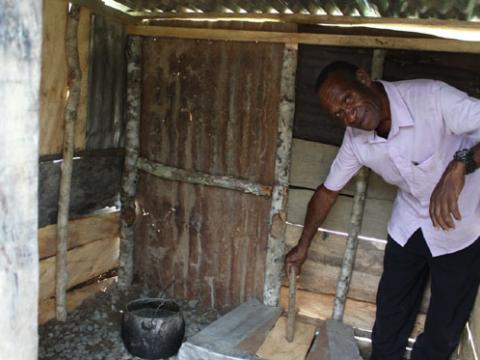Yali Inggibal's lion heart

He looks modest and skinny and he doesn't speak the Indonesian language fluently, however, his commitment to shaping a healthy lifestyle in Jayawijaya hills, Papua, captured the attention of the Indonesia's Ministry of Health.
Yali Inggibal is one of the community leaders in Air Garam village, Wamena, Papua. This father of four works daily as a village church leader and as a World Vision Indonesia's field facilitator. Even though he doesn't speak Indonesian fluently, he is able to understand it and translate it to the Walak tribe's language.
Not long ago, he was satisfied with his life in the village as it was.
Everything changed in November 2013 when Yali was asked to translate Indonesian language to traditional Walak language for a sanitation workshop held by World Vision.
The outdoor workshop was attended by all villagers who listened to Dr. Candra Wijaya's explanation about the risks of open defecation. Dr. Candra is World Vision Indonesia's Health Team Coordinator. Without saying too much, he asked the villagers to identify spots where they defecated daily. It turned out that most of the village land was contaminated by use as a 'natural toilet'.
Dr. Candra demonstrated with a fake fly, putting it on the feces that he found nearby, then dipped it in a drinking glass of water for a few seconds. That scene disgusted the villagers. They refused to drink the water in the glass, even though it looked like a normal drinking water.
Then, they realized the reason for diarrhea and death among their children, especially those who are under five-years-old. Unfortunately, the community members couldn't afford to build indoor latrines due to the price of cement in Papua. To our surprise, Yali became the only person who was annoyed enough by the absence of latrines in the village to do something about it.
After a brief discussion with Dr. Candra, Yali realized he could use a cement substitute found in his kitchen- the ashes left from traditional hearth firewood. A pile of ashes can transform into a cement-like substance when it is mixed with hot water. The solution had been sitting there for years, but no one realized it. Yali rushes to share his discovery with his friends. To attract the community to listen and participate, Yali got right to work.
"Once I got the idea, I went fishing and sold the fish to buy coffee, tea, and sugar. When everyone had gathered, I asked them to work together building latrines with the ashes," said Yali recalling the start of the sanitation revolution.
After only a few meetings, everyone agreed to build 63 latrines. They allocated 5 latrines as public facilities and use the rest for household purposes. Everyone in the village, fathers, mothers, and children worked together. To ensure the facilities met their purpose to lead to a cleaner, healthier life, Yali suggested communal fines for whoever was caught defecating outdoors. He or she would have to pay 30 USD fine to the village leader. It takes a lion heart to be able to say that in front of his own brothers and sisters, but Yali didn't mind.
His efforts captured the attention of the Ministry of Health who then declared Air Garam village and Manda village as the first villages to be free from open defecation in Papua. The happy day was inaugurated with a certificate signing by Hj. Muhammad Subuh, MPMM, Indonesia's Ministry of Health high rank official, on Friday, 30 January 2015.
*Written by Shintya Kurniawan, Media Relations Officer, World Vision Indonesia